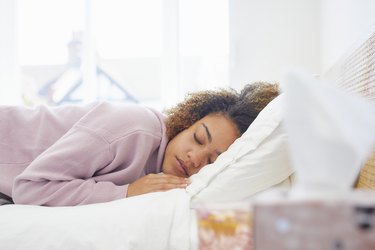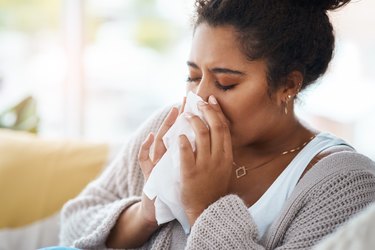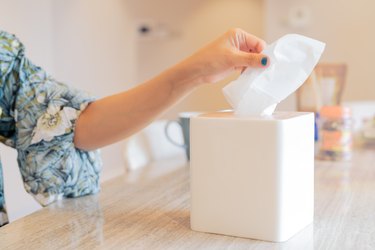
There are a lot of things you do in your sleep: Toss and turn, snore, have weird dreams. If you're sick, you might wake up in the middle of the night in a coughing fit. But can you sneeze in your sleep, too?
The short answer is no, you can't sneeze in your sleep, Christine Franzese, MD, an otolaryngologist with the ENT and Allergy Center at MU Healthcare in Columbia, Missouri, tells LIVESTRONG.com.
Video of the Day
Video of the Day
But of course, there's more to it than that. Read on for more about why you may be sneezing at night (and how to stop it if it's interfering with your sleep).
Causes of Sneezing
What causes sneezing? There are so many reasons why there may be a tickle in your nose that causes a sneeze. According to the National Library of Medicine, here's what may be going on:
- You have seasonal or indoor allergies
- You're reacting to an irritant, like dust, pollution, dry air, spicy foods or a nose-tickling powder
- You're taking certain medications
- You're experiencing strong emotions
- You're using a steroid nasal spray (perhaps to treat the above allergies)
- You have a cold or the flu
- You're going through drug withdrawal
Some people also have a photic sneeze reflex, which causes them to sneeze when they're exposed to bright sunlight, according to a September 2019 paper in Neuropsychopharmacology Reports.
What Happens When You Sneeze?
Gesundheit! A sneeze is triggered when something enters your nose — e.g. a pollutant or an allergen — and irritates the sensory nerves in your nasal cavity, Dr. Franzese says. (Specifically, that's your trigeminal nerve.) That nerve zips a signal to your brain that it's time to sneeze to expel the irritant.
In this way, sneezing is good for you, because it helps your body clear out potentially harmful substances. Excessive sneezing — aka sneezing many times in a row — is normal and usually just means your body needs to use a little extra oomph to expel the irritant.
"A sneeze is a coordinated movement," Dr. Franzese says. You inhale and hold the breath, your chest tightens, you close your eyes and then air is expelled quickly out of your nose or mouth, per the Library of Congress. (And yes, for the record, it is bad to hold in a sneeze.)
Is It Possible to Sneeze While Sleeping?
Generally, you don't sneeze in your sleep. The exception is in the very initial portion of sleep, where you're dozing off but not fully asleep, Dr. Franzese says — at that time, you could sneeze.
Otherwise, in deeper stages of sleep, particularly REM sleep, some of your muscles become temporarily paralyzed. "Your brain disengages from your motor nervous system," Dr. Franzese says. "The benefit is that if you're dreaming you're running a marathon, you won't physically act it out. Technically, you also can't sneeze."
It's possible that some irritant in the air disrupts you enough to wake you up or send you into a light enough stage of sleep where you then wake up and sneeze. "But you won't sneeze to wake yourself up," Dr. Franzese says. In other words: No, you can't sneeze in your sleep without waking up.
How to Stop Sneezing at Night
If you're sick or dealing with really bad allergies at the moment, symptoms like sneezing can certainly keep you up, cut into your sleep and make you tired the next day.
Your allergies can get worse at night if your bedroom increases your exposure to an allergen. For example: "Is there a lot of dust in your room or in the air vents? Is someone smoking in the residence? Is your cat or dog laying by your face in the bed?" Dr. Franzese says.
Limiting your exposure to irritants is key here, which might include:
- Removing pets from the bed or bedroom
- Using an air purifier to suck up irritants in the air that could set off sneezy symptoms
- Cleaning your room to remove dust and mold
Also, you might consider starting an over-the-counter allergy medication.
What Else Can’t You Do in Your Sleep?
OK, so you can't sneeze during sleep. But you can get a case of the hiccups while sleeping. (There's actually a case report to prove this, in the April 1988 issue of Sleep. Not surprisingly, there doesn't seem to be other research done in this area.)
You can't cough in your sleep, though. While it may feel as if you're "coughing in your sleep," what's really going on is that an irritant disrupts your sleep cycle, so you wake up just enough to cough, Dr. Franzese says.
She notes that coughing at night is a worrisome sign of uncontrolled asthma or acid reflux, especially in children. (Connect with their pediatrician for an evaluation.)
As for yawning? That's more of a grey area. It's certainly not common, but it seems to be possible, according to some case reports. Researchers aren't even sure why we yawn in the first place, though, so it's no wonder sleep-yawning is still a mystery.
The Bottom Line
You can't sneeze while in deeper stages of sleep due to temporary paralysis, which prevents you from moving around as you snooze and affects your ability to sneeze. However, something that triggers a sneeze can rouse you out of these deeper phases of sleep where you then wake up to achoo.
If you're sneezing a lot at night, it may be a sign of seasonal or indoor allergies. In that case, have a chat with your doctor to develop a treatment plan so you can rest easy.
Is this an emergency? If you are experiencing serious medical symptoms, please see the National Library of Medicine’s list of signs you need emergency medical attention or call 911.


